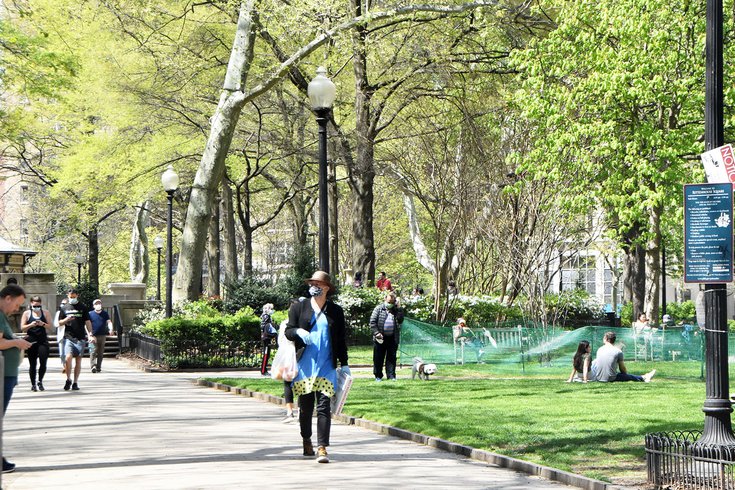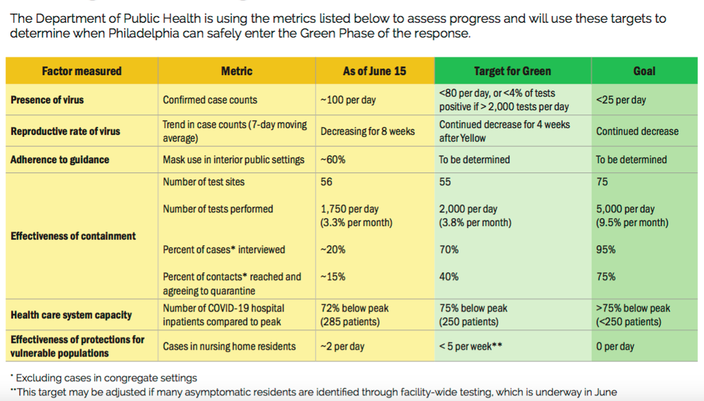
June 18, 2020
 HughE Dillon/for PhillyVoice
HughE Dillon/for PhillyVoice
Philadelphia has set a July 3 target to enter the green phase of Pennsylvania's COVID-19 reopening plan. City officials will continue to monitor key metrics on the path to further lifting business restrictions and easing some social distancing guidelines.
Philadelphia officials are confident the city will be on track to enter the green phase of Pennsylvania's COVID-19 reopening plan on July 3.
Mayor Jim Kenney and Health Commissioner Dr. Thomas Farley on Thursday released the city's "Reopening with Care" strategy. They outlined the targets the city must hit to enter the green phase, when restrictions on business and some social gatherings would lift further.
The plan revolves around containing the coronavirus, adhering to social distancing guidelines and protecting vulnerable populations. The graphic below displays the metrics the city will use to measure progress in the coming weeks.
The city currently is averaging fewer than 80 new cases per day, down from about 600 during the peak in April. Only about 3% of tests are now coming back positive, a drop from about 40% in April – even as testing increases.
"This happened because the number of new cases continues to drop, and the number of people getting tested continues to rise," Farley said. "These are both key metrics that we’re watching closely to make sure that we can reopen with care. I’m encouraged that our numbers look good, and continue to implore Philadelphians to take this seriously: wear a mask, stay six feet apart from each other, wash your hands frequently."
Pennsylvania Gov. Tom Wolf is expected to announce Thursday that the counties surrounding Philadelphia may enter the green phase on Friday, June 26.
Farley said that Philadelphia's position as a large, population dense city with a more severe epidemic means caution is necessary. He said the city is aiming to avoid surges seen in states like Florida, where restrictions were lifted early.
"We will be cautious on how we reopen," Farley said. "Philadelphia is uniquely at risk, as the most densely populated county in the state, with the highest number of cases and deaths from COVID-19. We don’t want to see a second wave of this epidemic. We will be more careful and will be more restrictive than the commonwealth in what activities are allowed and how they can operate."
As the city approaches the green phase, some activities may be able to resume on June 26 if progress continues:
• Residential swimming pools and private swim clubs
• Zoos (outside only)
• Personal services such as salons, barbers and spas
• Small indoor social and religious gatherings (up to 25 people)
The following activities will be allowed once Philadelphia reaches the green phase:
• Outdoor group recreational and sporting activities for youth and adults
• Gyms and indoor exercise classes
• Schools and colleges
• Libraries and museums
• Indoor shopping malls
• Outdoor performances and small outdoor events (up to 50 people)
• Restaurants with indoor seating (with occupancy restrictions)
Several activities will still be restricted under Philadelphia's modified version of the green phase. Dates for these activities to resume will be determined later based on continued progress:
• Casinos
• Restaurants and bars with indoor seating (no occupancy restrictions)
• Large outdoor events (more than 50 people)
• Theaters and indoor events
• In-person conventions and conferences
• Large indoor social and religious gatherings (more than 25 people)
• Senior services involving gatherings (such as adult daycares)
Philadelphia reported 68 new cases of COVID-19 on Thursday, bringing the city's total to 24,723. An additional 10 fatalities brought the city's death toll to 1,513, including 775 nursing home residents.
Hospitals in Philadelphia currently are treating 238 patients with COVID-19, while hospitals in Southeastern Pennsylvania are treating 449 COVID-19 patients.
As the city approaches the green phase, the health department primarily will focus on two early warning signs moving forward.
Syndromic surveillance will track the number of people seen in hospital emergency departments with symptoms similar to COVID-19. These numbers rose sharply during the peak, but have fallen by more than 70% over the past two months.
The second metric is the percentage of internet-connected thermometer measurements showing fevers in Philadelphia-area residents. While these values increased significantly in March and April, they have since fallen to levels typical at this time of year.
"Philadelphia has continued to make progress in the fight against the COVID-19 coronavirus," Kenney said. "Daily case counts are falling, residents are wearing masks, and the number of patients hospitalized with the infection is steadily dropping. If progress continues through June, Philadelphia should be ready to carefully reopen additional activities in early July. Carefully is the operative word to prevent a second wave of the infection."
 Source/City of Philadelphia
Source/City of Philadelphia